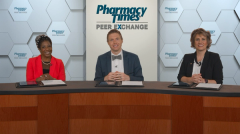
Patient Engagement and Education for Pneumococcal Vaccines
The significance of engaging patients and providing key educational points regarding pneumococcal vaccines is highlighted.
Episodes in this series

Ryan Haumschild, PharmD, MS, MBA: Dr Madison, you’re out there as a public health pharmacist engaging with patients. How can we engage these patients to educate and emphasize the need and benefits associated with immunizing against pneumococcal pneumonia and immunizations as a whole?
Christina Madison, PharmD, FCCP, AAHIVP: First, I want to acknowledge that it takes a village. It takes all of us working together and talking about our physician and nurse colleagues, as well as using things like community health workers. They were so impactful during the pandemic and underutilized. We’re getting to the point where CMS [Centers for Medicare & Medicaid Services] is going to pay them for their services. I see this with peer advocacy because I work a lot with individuals who are affected and infected by HIV, and we see those peers who want to help others who are at risk. It’s hard to do that when [CMS] can’t pay them for their services. So I want to give out a shout-out to community health workers.
I also want to talk a little about our migrant community because they’re disproportionately impacted. I did some work at the border in Laredo, Texas, helping with ICE [Immigration and Customs Enforcement] detention and individuals who are coming into this country needing to be vaccinated, needing to be screened for COVID-19. I saw the fear in their faces. Part of it is because of this misinformation around what we call the public charge rule and whether seeking public services will impact their ability to get citizenship in this country. We need to dispel those rumors. We need to get out there and tell individuals that they can access these services and this isn’t going to impact their ability to become a citizen in the United States.
There are multiple things we can do. [We also need to be] mindful that there are cultural things and lived experiences, individuals may have experienced trauma associated with engaging in the traditional health care system, which may be why they choose not to seek preventive services. We see this so much in the LGBTQ population. My queer brothers and sisters will come to the health care system thinking that they’re going to get care and compassion, and instead they get stigmatization and discrimination. We need to address the fact that sometimes, when individuals come to us, we need to look at that through a trauma-informed lens to be truly health equitable.
Ryan Haumschild, PharmD, MS, MBA: Dr Bridgeman, health care professionals experience a lot of vaccine hesitancy…when interacting with patients. We’ve seen vaccine fatigue among patients over the past couple of years due to the COVID-19 immunizations that we’ve been diligent about. How have eligible patients responded to being offered immunizations against pneumococcal diseases? Do you see some of that halo effect or carryover from COVID-19 to some of these vaccines?
Mary Bridgeman, PharmD, BCPS, BCGP, FASCP: Absolutely. There’s evidence that pneumococcal immunization rates increased during the COVID-19 pandemic. We saw an increase in uptake in some of the vaccine preparations we’re talking about, due to this awareness. More individuals wanted to be protected against secondary bacterial pneumonia. The risk was a motivating factor or an awareness of the potential risks associated with contracting pneumococcal disease on top of a viral respiratory illness. As the urgency of the pandemic begins to subside, we can’t let our guard down. We have lots of enthusiasm these vaccine preparations. It’s critical that we continue our efforts, and our educational campaigns to increase awareness. [We have] initiatives to ensure that individuals receive these vaccines and are aware of the risks of invasive pneumococcal disease. We talked about a less than 25% uptake in pneumococcal vaccination rates in individuals who are aged 19 to 64 and at high risk of disease. It’s critical to convey that message appropriately.
Ryan Haumschild, PharmD, MS, MBA: We have a lot of listeners, whether they’re physicians, advanced practice practitioners, pharmacists, nurses, or community health providers. What are some of the strategies they can do to educate patients and help some of these populations overcome vaccine hesitancy and fatigue? If you’re talking to them, what strategies would you employ to help overcome some of those barriers that we brought up?
Mary Bridgeman, PharmD, BCPS, BCGP, FASCP: In studies done by the Kaiser [Family] Foundation and other cross-sectional evaluations looking at these issues, it’s often an individual’s awareness of their risk and a strong, positive health care provider’s recommendation for vaccination. These tend to be the best predictors of vaccine uptake and instill vaccine confidence in individuals receiving vaccines. Also, vaccine confidence exists on a spectrum. [Some] individuals who will be enthusiastic to receive that vaccine based on a positive recommendation or new vaccine availability. [Others] may never choose to become immunized, regardless of the information we provide. It’s necessary [for us] as health care providers to meet those individuals who are on their journey of contemplation of making an informed health care decision, [so we can] address the concern…that has caused them to not take action or to ask, “Is this right for me?” We need to evaluate our patients’ concerns.
We need to create safe spaces for patients to talk about their hesitations. “I saw this on Facebook. My friend told me this.” Maybe they had a family member who had an experience with another vaccine preparation. We need to create spaces where our patients can talk through those challenges because they’re always different. It’s never a cookie-cutter response when we think about instilling confidence in our vaccine products.
The other thing we have to remember is that patients who initially refuse a vaccine can change their minds at any time. That was a key message during COVID-19. That’s how I feel about the pneumococcal and influenza vaccines. It’s OK to change your mind, and I’m going to support you in that decision. Engaging in that type of support is a critical strategy for instilling confidence.
Christina Madison, PharmD, FCCP, AAHIVP: Sometimes it’s not for lack of wanting. It may be that it never got brought up. A lot of times, I’ll tell the patient for the first time that they may have a risk factor. They’re like, “My doctor never told me that.” I want to reemphasize that it takes a village. [We need] a warm handoff between our physician and nurse colleagues to make sure they know. They make that suggestion and say, “You can get this vaccine at the pharmacy.” Now we’ve primed the pump: another trusted, valuable messenger is communicating that health information. Now you’re going to have that same positive reinforcement when you get to the pharmacy setting.
Mary Bridgeman, PharmD, BCPS, BCGP, FASCP: It’s our vaccine neighborhood. Even when there’s a change in care transitions or in one’s living situation, it’s a good opportunity to reconcile that history and potentially use that as leverage in conversations with our patients.
Transcript edited for clarity.
Newsletter
Stay informed on drug updates, treatment guidelines, and pharmacy practice trends—subscribe to Pharmacy Times for weekly clinical insights.



























